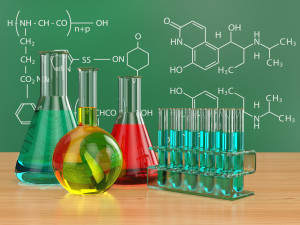
Chemistry
If you’re looking for an in-demand medical career, you may want to consider the type of chemistry jobs available in the healthcare industry. Although chemists can work in a variety of different sectors, many are choosing the clinical pathway towards healthcare to study cells, tissues, DNA, blood samples, and more. Chemistry plays an important role in medical research that allows doctors to make more precise, faster diagnoses and improve the health outcomes of their patients, according to the American Chemistry Council. Understanding the structure and properties of chemicals is also essential for creating new antibiotics that could potentially save lives. Below are the most popular chemistry jobs that will enable you to impact the efficiency of healthcare services.
Medical Laboratory Scientist
Chemistry majors are the perfect fit for becoming medical laboratory scientists for performing routine and complex lab tests on patients. After a physician or surgeon orders testing, the medical laboratory scientist will prepare the patient’s sample, use sophisticated equipment to analyze the fluid, note any abnormal findings, and record data on the results. Medical providers depend on laboratory scientists to accurately identify anomalies in samples that could point to a certain diagnosis. Medical laboratory scientists mostly work in hospitals, but they’re also found in diagnostic labs, physician offices, and universities.
Toxicologist
Toxicologists perform scientific testing on bodily fluids to determine whether a patient’s body is being effected by alcohol, drugs, poison, gas, metal, or any other chemical. Many toxicologists specialize in forensics to collect chemical evidence in autopsies to help law enforcement officials solve crimes along with medical examiners. Toxicologists may also work in the pharmaceutical industry to determine how prescription medications will impact the human body. Depending on their unique interests, toxicologists can work in medical laboratories, private drug testing facilities, police agencies, research institutions, and pharmaceutical firms.
Biomedical Chemist
Biomedical chemistry is a unique branch that focuses on applying knowledge of elements and reactions to making advancements in the treatment of human disease. Biomedical chemists work diligently to conduct chemical research for fighting cancer, Alzheimer’s disease, influenza, HIV, alcoholism, and other prevalent diseases. Biomedical chemists will pioneer scientific studies to determine the cause, effect, and best treatment for illnesses plaguing public health. You can find most jobs for biomedical chemistry in pathology labs, hospitals, private corporations, non-profit organizations, and government agencies.
Industrial Hygienist
Having a background in chemistry can also prove valuable for becoming an industrial hygienist and carving a successful career in environmental health. Industrial hygienists are trained scientists who protect the safety and health of people in our nation’s workforce by guaranteeing compliance with imposed government regulations. Industrial hygiene is concerned with mold, asbestos, radiation, lead paint, and other chemicals in workplaces that could potentially harm employees’ health. Senior-level professionals who have become Certified Industrial Hygienists (CIH) may develop occupational safety protocols to keep work communities safe too.
Related Resource: Nutrition Science Jobs
Overall, chemistry is a versatile degree that can be applied in many areas of healthcare. Before you can choose clinical chemistry as a career, you’ll need to earn at least a bachelor’s degree from an accredited academic institution, according to the American Association of Clinical Chemistry. Attending graduate or medical school to receive a master’s or doctoral degree will be needed for leading your own research though. Now that you know the type of chemistry jobs available in the healthcare industry, you can form your career goals accordingly and pursue coursework related to your individual chemistry interests.